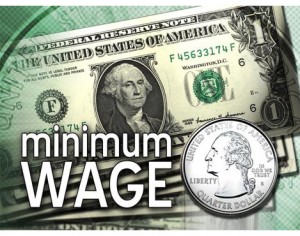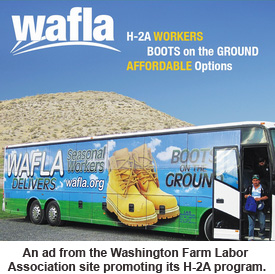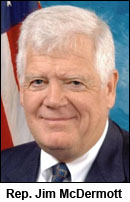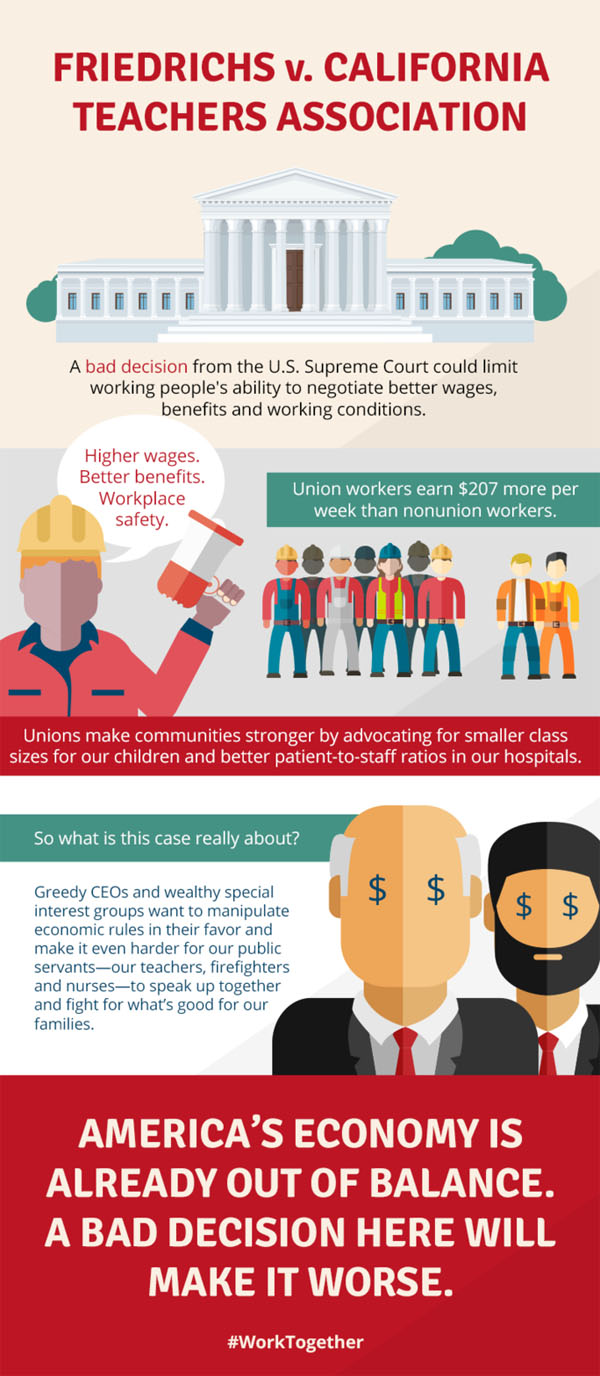NEWS ROUNDUP
Wage suppression, McDermott to retire, #YallQueda…
Monday, January 4, 2016
MINIMUM WAGE
 ► In the Bellingham Herald — State minimum wage remains at $9.47 in 2016 — Washington will no longer have the highest minimum wage in the U.S. Alaska, California, Connecticut, Massachusetts and Rhode Island will have higher rates.
► In the Bellingham Herald — State minimum wage remains at $9.47 in 2016 — Washington will no longer have the highest minimum wage in the U.S. Alaska, California, Connecticut, Massachusetts and Rhode Island will have higher rates.
ALSO TODAY at The Stand — Wages flat, except where citizens took action
► From PubliCola — Labor groups gear up for statewide minimum wage campaign — The Washington State Labor Council, SEIU, UFCW, and Nick Hanaeur (with help from consultant Christian Sinderman) are gearing up to run a statewide minimum wage and paid leave ballot initiative. According to a job listing, the group is hiring a field director and field organizers.
► In The Atlantic — New year, new wages — Those fighting for a higher minimum wage have cause to celebrate, as the start of 2016 means laws raising the minimum wage go into effect in 12 states. Additionally, the minimum wage in Maryland and D.C. will go up in July, and inflation adjustments will be made to raise the minimum wage in Colorado and South Dakota as well. A handful of cities and counties, including New York, will also see minimum-wage increases.
STATE GOVERNMENT
 ► In the Yakima H-R — Report: Growers were coached by industry group to keep down wages of farm workers — A recent state survey on wage rates for farm workers was biased by an industry group’s “recommended answers” in an apparent attempt to keep standard minimum wages low, state officials say. The data is used by the federal Department of Labor to set wage rates for employment contracts, such as those for guest workers under the H-2A program. A state analysis found distinct differences from previous years reflecting the guidance provided by the Washington Farm Labor Association provided to apple, cherry and pear growers.
► In the Yakima H-R — Report: Growers were coached by industry group to keep down wages of farm workers — A recent state survey on wage rates for farm workers was biased by an industry group’s “recommended answers” in an apparent attempt to keep standard minimum wages low, state officials say. The data is used by the federal Department of Labor to set wage rates for employment contracts, such as those for guest workers under the H-2A program. A state analysis found distinct differences from previous years reflecting the guidance provided by the Washington Farm Labor Association provided to apple, cherry and pear growers.
► In the Seattle Times — State agency says trade group may have influenced farm-wage survey — Washington Farm Labor Association is the state’s largest recruiter of guest workers from Mexico under the federal H-2A program, with more than 6,000 contracts in the last few years.
► In the Seattle Times — ‘Revenue neutral’ carbon-tax initiative could cost state $675 million — A state analysis estimates the supposedly ‘revenue neutral’ I-732 ballot measure would reduce state tax revenues by about $675 million over four years — not a desired outcome for advocates of more education and mental-health funding.
► In the (Everett) Herald — Voters will decide fate of I-732 — There’s going to be opposition. But the loudest opponents may not be in the ranks of climate change deniers but among those in a coalition of environmental, labor and progressive groups.
► In the Olympian — Fix to stop early prison releases delayed 16 times — The software fix that would have ended the mistaken early release of inmates from state prisons was delayed 16 times since 2012, Corrections Secretary Dan Pacholke said. He said a variety of factors contributed: Delays occurred while the software remedy was being devised and supposedly launched, and the task was not correctly prioritized.
From KUOW — Two people now known to have died because of prison software glitch
► In today’s Seattle Times — State dentists lobby is blocking low-cost care — Dental health for the poor is a big problem in Washington state. Some see dental therapists — licensed professionals who can perform simple procedures — as a route to less expensive care. But the powerful state dentists association has thwarted efforts to allow the therapists.
LOCAL
 ► This morning from AP — Longtime Rep. Jim McDermott to retire — Longtime Democratic Rep. Jim McDermott of Washington state is announcing his retirement. That’s according to a Democratic official who tells The Associated Press that McDermott has been making calls to colleagues to let them know. The official spoke on condition of anonymity ahead of a Monday news conference McDermott scheduled in Seattle.
► This morning from AP — Longtime Rep. Jim McDermott to retire — Longtime Democratic Rep. Jim McDermott of Washington state is announcing his retirement. That’s according to a Democratic official who tells The Associated Press that McDermott has been making calls to colleagues to let them know. The official spoke on condition of anonymity ahead of a Monday news conference McDermott scheduled in Seattle.
EDITOR’S NOTE — Last month, state Rep. Brady Walkinshaw (D-Seattle) announced he planned to challenge McDermott for his seat this fall.
► From AP — Joint Base Lewis-McChord to cut about 900 civilian jobs — JBLM is expected to cut about 900 civilian jobs over the next few years, with most of the reductions accomplished by not filling openings and offering incentives for early retirement.
► In today’s Seattle Times — UW says its doctors in training want too much money — University of Washington brass say they’re committed to providing the UW’s medical residents and fellows with decent compensation and benefits, but they insist the newly unionized doctors in training are asking too much in contract negotiations.
► From KPLU — Janitors sue Fred Meyer in class-action suit allege wage violations — The janitors were employed by a subcontractor, MH Janitorial, which has since gone out of business. They say MH failed to pay them for work they did after their shift was supposed to end. But the janitors’ attorney said the case is about more than that. He said a big issue is whether Fred Meyer can be held responsible for possible wage violations by its subcontractor.
FREE TRADE
 ► From AP — U.S. repeals meat labeling law after trade rulings against it — Lawmakers said they had no choice but to get rid of the labels after the World Trade Organization repeatedly ruled against them. The WTO recently authorized Canada and Mexico, which had challenged the law, to begin more than $1 billion in economic retaliation against the United States.
► From AP — U.S. repeals meat labeling law after trade rulings against it — Lawmakers said they had no choice but to get rid of the labels after the World Trade Organization repeatedly ruled against them. The WTO recently authorized Canada and Mexico, which had challenged the law, to begin more than $1 billion in economic retaliation against the United States.
► In today’s Washington Post — Obama’s Pacific Rim trade pact picks up big endorsement — The backing of the National Association of Manufacturers was not unexpected, but it came as the Obama administration has sought to increase pressure on Republican congressional leaders to schedule a vote on the 12-nation TPP by the summer.
FEDERAL GOVERNMENT
► In today’s NY Times — Many see IRS penalties as more affordable than insurance — Clint Murphy, an engineer in Sulphur Springs, Tex., estimates that under the Affordable Care Act, he will face a penalty of $1,800 for going uninsured in 2016. But in his view, paying that penalty is worth it if he can avoid buying an insurance policy that costs $2,900 or more. All he has to do is stay healthy.
EDITOR’S NOTE — If he doesn’t stay healthy, the cost of his care will be passed on to the rest of us, driving health care costs higher, which is why the penalty exists.
► In today’s NY Times — Elections have consequences (by Paul Krugman) — The 2012 presidential election didn’t just allow progressives to achieve some important goals. It also gave them an opportunity to show that achieving these goals is feasible. No, asking the rich to pay somewhat more in taxes while helping the less fortunate won’t destroy the economy.
#YallQueda
► From CNN — Armed group’s leader in federal building: ‘We will be here as long as it takes’ — Armed anti-government protesters have taken over a building in a federal wildlife refuge in Oregon, accusing officials of unfairly punishing ranchers who refused to sell their land.
EDITOR’S NOTE — Are state Reps. David Taylor (R-Moxee) and Matt Shea (R-Spokane Valley), who rushed to Nevada to support racist rancher Clive Bundy in 2014, on their way to Oregon now?
► In today’s Washington Post — Why aren’t we calling the Oregon occupiers ‘terrorists?’
► From Think Progress — What you need to know about the current militia standoff in Oregon — While the attempted provocation is ostensibly about one particular federal case against ranchers, the full backstory involves a volatile mix of anti-government ideology and industrial greed. And though armed men grab the media’s attention, the story unfolding in Burns should also serve to highlight the stark divide between the habits and ideas of the American ranching community and a minuscule fringe of extremists within that community who are trying to steal the spotlight.
TODAY’S MUST-READ
 ► In the Int’l Business Times — The end of unions? Upcoming Supreme Court case could overturn power to collect fees — A Supreme Court case beginning Jan. 11 could sound a death knell on labor organizations that have grown accustomed to heightened limitations and declining memberships in recent years. Friedrichs v. California Teachers Association will determine whether mandatory union dues violate workers’ freedom of speech, and experts say a ruling could dictate the future of unions’ ability to collect fees from their memberships in what plaintiffs hope will be a win for individual rights and defendants fear is an attack on collective bargaining.
► In the Int’l Business Times — The end of unions? Upcoming Supreme Court case could overturn power to collect fees — A Supreme Court case beginning Jan. 11 could sound a death knell on labor organizations that have grown accustomed to heightened limitations and declining memberships in recent years. Friedrichs v. California Teachers Association will determine whether mandatory union dues violate workers’ freedom of speech, and experts say a ruling could dictate the future of unions’ ability to collect fees from their memberships in what plaintiffs hope will be a win for individual rights and defendants fear is an attack on collective bargaining.
A decision swaying against unions, experts say, could effectively implement a national right-to-work policy that secures the right of workers to choose not to pay agency fees and therefore guts unions’ power to finance themselves. Union leaders have warned that the plaintiffs’ First Amendment argument at the root of the case is being dishonestly presented, framing the issue as one of individual rights and freedom of speech rather than a direct assault on unions and the fees they collect.
The Stand posts links to Washington state and national news of interest every weekday morning by 10 a.m.





